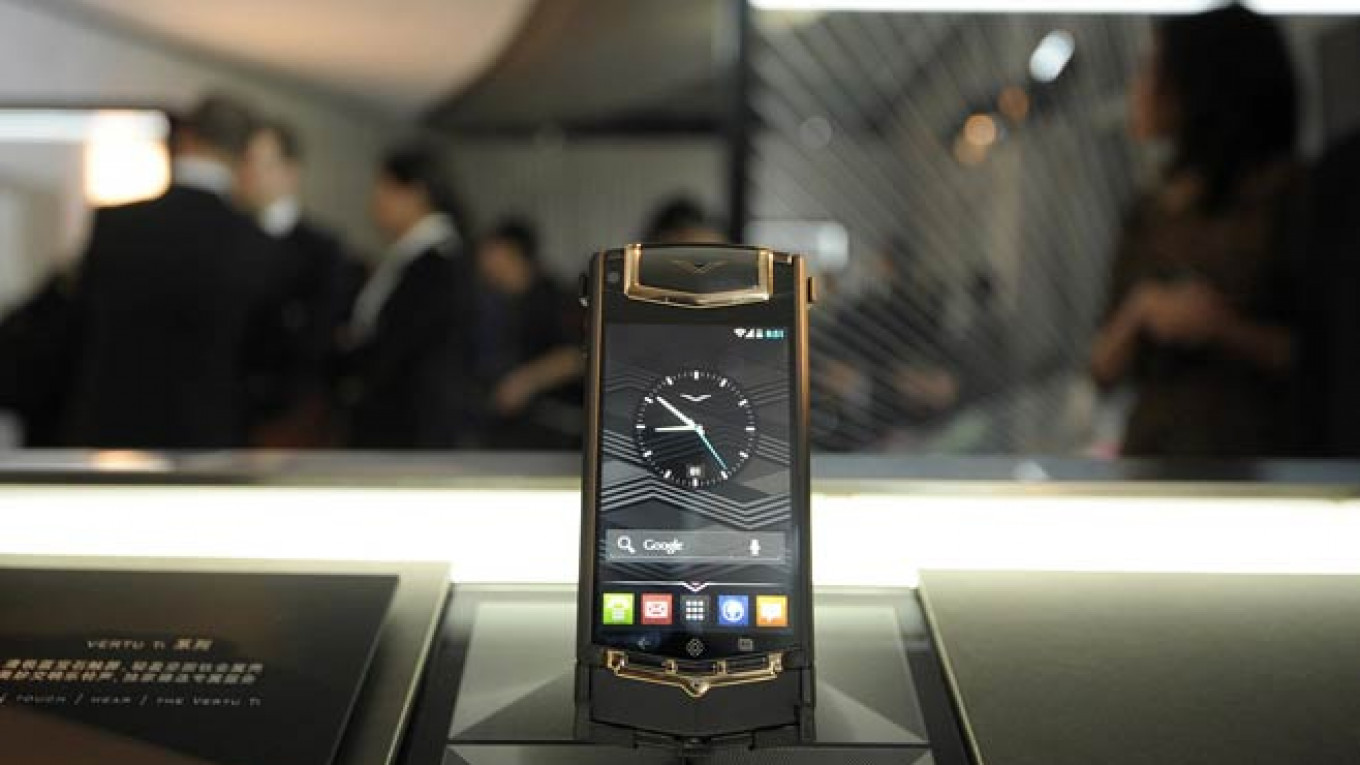Confident in the promise of Russia's appetite for opulence, luxury mobile phone producer Vertu is seizing direct control of its local boutiques in a drive to buttress that most treasured asset of high-end products: its brand image.
The integrity of its brand is of utmost importance for Vertu, which was the first company to, in 2004, turn mobile phones into a high-end luxury product. Vertu phones are hand-assembled in England from exotic materials, such as crocodile skin and titanium, and tested more than 300 times before they reach stores. Their prices in the Moscow boutique range from 240,000 rubles ($6,700) to 951,000 rubles ($26,600).
One of the greatest threats the brand faces is the myriad of unauthorized dealers and repair centers that have popped up across Russia posing as genuine affiliates, CEO Massimiliano Pogliani told The Moscow Times in an interview at one of Vertu's Moscow boutiques.
Massimiliano Pogliani, Vertu's CEO, discusses Russia's luxury products market and the company's strategies.
"The key message is that we are totally, strongly against this and we want to fight this as much as we can. Now that we are here directly as a company, we will do it as priority number one," Pogliani said.
Resolving the issue falls to both the company and the consumer, he said. "The customer should not feed this market and should only buy our products in the official, authorized channels," he said. In return, the company has to ensure that its own services are top-class.
Taking a direct role in Russia will also allow Vertu to raise the level of its own customer service, which has been a problem in the past, Pogliani said. Consistent service is key for luxury products, whose globetrotting customers are as likely to have visited a Vertu boutique in Milan or London as in Moscow and will easily spot the difference.
Vertu launched operations in Russia in 2004 as many global companies do: by working with a local distributor, Wital, who had the contacts and knowledge needed to get the business of the ground.
But as the Russian market, now Vertu's second largest after Asia, became increasingly important, "we understood that it was the time to manage this market directly," Pogliani said.
The company took over its boutique in Moscow's luxury shopping center GUM in January, then gradually took ownership of its boutiques in Yekaterinburg and St. Petersburg and its two other locations in Moscow.
But while luxury brands such as Vertu continue to focus on their Russian operations, some industry analysts are skeptical as to its long-term prospects.
"The Russian luxury market has never totally recovered from the financial crisis and commodity price correction," said Thomas Chauvet, head of luxury goods equity research at international financial services corporation Citi. "The complexity and high cost of doing business and political uncertainty" in Russia will also stymie growth, he added.
"Russia remains an oligarchical society; the lack of a broad, aspiring middle class limits the potential of luxury demand in the country in our view," Chauvet said.
Vertu is confident, however, that despite flagging growth in the wider economy, Russia's luxury market will continue to thrive. Other companies in the market have echoed this self-assurance: Italian fashion brand Gucci earlier this month also announced plans to take direct control of its three shops in Moscow and to open two new stores in the capital, Reuters reported.
Nonetheless, the political crisis in Ukraine does give reason for concern. "It creates this climate of uncertainty and instability, you do not know when and if it will end, so people become more prudent in their purchasing approach," Pogliani said.
The uneasiness impacts jet-setting Russian consumers' decisions in stores across the major European metropolises as well. Vertu has noted a "small decline in the purchases of Russian customers" there, Pogliani said.
French multinational luxury goods conglomerate LVMH, owner of such famed brands as Dior, Louis Vuitton and Veuve Clicquot, has said that demand from Russian tourists in Europe softened in recent weeks due to geopolitical tensions between Russia and Ukraine, Chauvet said.
In taking over its operations in Russia, Vertu is also seizing the opportunity to show that, with new ownership, new management and a new operating system, a new era has dawned for the company.
Vertu was founded as a subsidiary of Nokia in 2004 and only separated from its former parent company in 2012, when private equity group EQT purchased a 90 percent share. The change in ownership has allowed Vertu to transition from the Nokia operating system to a tailored version of the more popular Android platform.
The brand has also recently striven to craft a more subtle, elegant image, following a global trend that began in Europe and spread rapidly throughout Asia, the Middle East and Russia in the wake of the crisis of 2008 and 2009, Pogliani said.
Russian luxury consumers, just like their counterparts across the world, are eager to "be recognized in a more understated way, not like it was in the past by showing off their wealth, but by showing more their knowledge, their discernment, the fact that they know certain things," Pogliani said.
It is this next generation of global luxury consumers that Vertu wants on its side. As Pogliani notes, at the end of the day, "it is important to be in the hands of the right people."
Contact the author at d.damora@imedia.ru
A Message from The Moscow Times:
Dear readers,
We are facing unprecedented challenges. Russia's Prosecutor General's Office has designated The Moscow Times as an "undesirable" organization, criminalizing our work and putting our staff at risk of prosecution. This follows our earlier unjust labeling as a "foreign agent."
These actions are direct attempts to silence independent journalism in Russia. The authorities claim our work "discredits the decisions of the Russian leadership." We see things differently: we strive to provide accurate, unbiased reporting on Russia.
We, the journalists of The Moscow Times, refuse to be silenced. But to continue our work, we need your help.
Your support, no matter how small, makes a world of difference. If you can, please support us monthly starting from just $2. It's quick to set up, and every contribution makes a significant impact.
By supporting The Moscow Times, you're defending open, independent journalism in the face of repression. Thank you for standing with us.
Remind me later.






